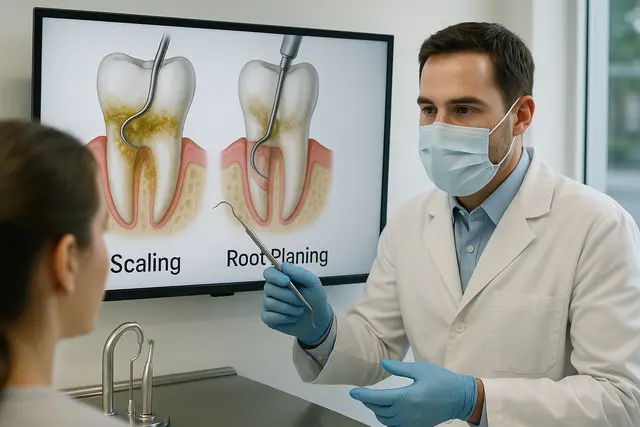General Dentistry
4 min read
May 12, 2025
How Long Does a Dental Cleaning Take? Average Time & What to Expect
Wondering how long a dental cleaning actually takes? You’re not alone. Whether it’s your first visit in years or just another six-month checkup, understanding the time and process behind dental cleanings can ease the nerves and help you plan your day. Here’s what really goes on in that chair, and how your oral habits play a role in the clock.

What Happens During a Routine Dental Cleaning Appointment
When you slide into the chair for your routine dental cleaning, the first question usually pops out before the bib is clipped: “How long will this cleaning take?” For most people it’s 30 to 60 minutes, yet the exact dental cleaning take depends on the process of removing plaque that has built up since your last dental cleaning. Your dentist and a cheerful dental hygienist greet your teeth and gums, snap an x-ray to examine your teeth, and check for cavity trouble or early decay. They also look for bleeding gums, loose teeth, and hardened plaque lurking under the enamel. Here’s what you can expect next.
During scaling, the clinician may use an ultrasonic tip to remove plaque and tartar from your teeth and along the gum line, then follow with hand instruments for removing plaque and calculus stuck to the crowns. If periodontal pockets or gum disease show up, scaling and root planing may be necessary. That deep teeth cleaning can take longer because the hygienist first performs gross debridement when calculus from the surface is too chunky for regular tools.
Once the big stuff is gone, the hygienist will polish your teeth with a gritty paste, a moment that feels like beach sand but tastes like bubble-gum. That polishing smooths the surface of the teeth so plaque from getting a foothold is tougher. Next comes a quick floss, a fluoride treatment to strengthen enamel, and a rinse. Professional teeth cleaning visits should land every six months because the longer you wait, the more cleaning may be needed, and the more it may take longer.
Understanding the Different Types of Dental Cleanings
There are different types of dental cleanings depending on your oral health status. Routine dental cleanings handle daily debris and early-stage plaque, while a deep cleaning, also called periodontal maintenance, targets the deeper pockets caused by gum disease. Another type of dental cleaning, gross debridement, is often recommended for patients who haven’t been to the dentist in years and arrive with extensive hardened calculus. Teeth cleanings of any style begin with an x-ray, a gentle chat about oral health, and the same goal: keep your teeth healthy, dodge oral health issues, and protect your overall dental care long-term.
How Long a Dental Cleaning Takes Depends on Your Oral Hygiene Habits
How long individual cleanings run depends on lifestyle, past dental procedures, and how well you practice good oral hygiene at home. Brushing and flossing twice a day helps, but if plaque and tartar have invited calculus to camp out, the dental hygienist will use an ultrasonic scaler, extra hand instruments, and possibly focused root planing. A standard cleaning may take around forty-five minutes for someone who sticks to a regular schedule, yet if you arrive with bleeding gums, hardened plaque, or deep periodontal pockets, the cleaning can take closer to ninety. Depending on the extent of the cleaning needed, the goal stays the same: remove plaque, stop tooth decay, and make sure there are no teeth to remove.
What Your Dentist Looks For During Every Dental Visit
Modern dentistry is equal parts science and supportive coaching. Your family dentist will talk through your dental insurance options, recommend the right fluoride toothpaste, and remind you to brush, floss, and rinse as part of a daily hygiene routine. They’ll nudge you to schedule an appointment today if it’s been more than every 6 months since your last checkup. Basic dental care advice is straightforward: brush gently, floss your teeth nightly, and sip water after sweets. These small habits help prevent plaque buildup, keep your teeth and gums healthy, and stop oral health issues before they start. Ignoring warning signs, like bleeding gums or tooth sensitivity, can allow problems to grow, which may require more involved procedures like scaling and root planing later on.
Here’s What to Expect and Why a Cleaning Is Always Worth the Time
At your next dental visit, remember that the extent of the cleaning, not just the clock, sets the pace. A simple cleaning can wrap up in under an hour while you chat about weekend plans, but a deep cleaning that involves root planing, polishing, and extra steps might take up the full appointment. Either way, you’ll leave with your teeth cleaned, your enamel protected with fluoride, and a clear plan to keep your smile in top shape. If you’re overdue or haven’t been to the dentist in years, don’t worry, just schedule an appointment today. The team is ready to help you reset, restore, and protect your teeth and gums so you can walk out smiling brighter than ever.
How Long Does a Routine Dental Cleaning Usually Take?
Most routine dental cleanings take between 30 to 60 minutes. The exact time depends on your oral health, how much plaque and tartar have built up, and whether you’re due for a deep cleaning. If your teeth and gums are in good shape and you visit the dentist regularly, cleanings are usually quicker. More buildup, gum issues, or overdue visits may require longer appointments.
What Happens During a Professional Dental Cleaning?
A routine cleaning begins with an exam and possibly an x-ray to check for hidden problems. The hygienist then removes plaque and tartar using ultrasonic tools and hand instruments, followed by polishing with a gritty paste. You’ll also get a flossing, fluoride treatment, and a rinse. The goal is to remove buildup, strengthen enamel, and keep your teeth and gums healthy between visits.
What’s the Difference Between a Regular Cleaning and a Deep Cleaning?
A regular cleaning focuses on removing plaque and tartar above the gumline and is ideal for patients with healthy gums. A deep cleaning, or scaling and root planing, targets plaque buildup below the gumline and is necessary for those with gum disease or deep periodontal pockets. Deep cleanings are more involved and may require multiple appointments.
Why Are Regular Dental Cleanings Important?
Routine dental cleanings help prevent tooth decay, gum disease, and serious oral health problems. Even with good brushing and flossing at home, professional cleanings reach areas your toothbrush can’t. Skipping cleanings allows plaque to harden into tartar, which can lead to gum inflammation, tooth loss, or costly treatments later. Regular visits keep your mouth healthy and your smile strong.
Read Next
Related Posts

General Dentistry
Can a Sinus Infection Make Your Jaw Hurt? Understanding the Connection
Jaw pain can be unsettling, especially when it seems to appear out of nowhere alongside a stuffy nose or headache. Many people are surprised to learn that sinus infections can cause discomfort that feels like it’s coming from the jaw. Understanding the connection between your sinuses and jaw pain is key to getting the right treatment.
5 min read
Sep 15, 2025

General Dentistry
How to Stop Nerve Pain in Tooth: Fast Relief That Works
Tooth nerve pain can be one of the most intense and disruptive types of discomfort. It often strikes without warning and makes everyday activities like eating, drinking, or even talking feel unbearable. Understanding what causes this pain and how to manage it effectively is key to getting fast relief.
4 min read
Sep 15, 2025

General Dentistry
What Is SRP in Dentistry? A Complete Guide to Scaling and Root Planing
When it comes to dental health, most people think regular cleanings are enough to keep their smile safe. But sometimes, what’s happening below the gumline needs more attention. Scaling and root planing (SRP) is a treatment designed to address gum disease at its source, protecting both your gums and teeth from long-term damage.
5 min read
Sep 10, 2025
Don’t have time to research every dentist around you?
See why 30k+ patients trusted us